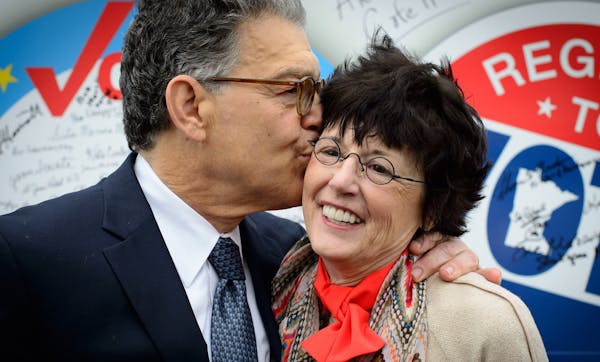DULUTH – With just over a month until the election, U.S. Sen. Al Franken and his Republican challenger Mike McFadden squared off for the first time in an early morning debate that found the incumbent defending his voting record on the Affordable Care Act, Iron Range mining jobs and the environment.
For months the campaigns have traded attacks in television advertisements, stump speeches and news releases, and although the tone of Wednesday's confrontation was largely cordial, the onslaught continued.
After congratulating Franken and his wife, Franni, on their upcoming 39th wedding anniversary, McFadden took the first swipe during the hourlong debate, repeating a key campaign refrain that Franken functions as a rubber stamp for President Obama by voting with him 97 percent of the time — a statistic invoked so frequently by McFadden that Franken made light of it.
"I'm sorry, what was that number? Let me write it down or I'll forget it," Franken said to laughs from the audience.
McFadden, undeterred, said the statistic was significant.
"I believe the biggest single issue in this country is we've created a professional class of politician and it's killing us," McFadden said. "I believe in six years Sen. Franken has become part of that class." McFadden called Franken the most partisan Democratic senator in Congress, citing a study that showed Franken voting 159 out of 161 times with his party.
Franken, who was relatively subdued onstage compared to a fiery McFadden, said every vote he made was in the interest of Minnesotans. "In an era where there's been a lot of gridlock, I've worked across party lines to find common-sense solutions," Franken said, ticking off the names of GOP senators like Lamar Alexander of Tennessee and Pat Roberts of Kansas, with whom he's co-sponsored bills.
Franken noted that the study McFadden cited also lists Sen. Ted Cruz, R-Texas, who led last year's government shutdown, as one of the most nonpartisan in the Senate. "On opposite ends of the spectrum, Al Franken is the Ted Cruz of the Democratic Party," McFadden retorted.
McFadden accused Franken of holding up energy projects like the proposed Keystone XL pipeline, overburdening rail lines tasked with hauling oil instead of other goods. "There's not been one pipeline built … the Keystone pipeline has been under the review process for six years," he said. "That is crazy. … Until you start passing pipelines, we're going to have a rail car shortage."
Franken acknowledged that he voted "to not circumvent the regulatory process," but said he also voted for a proposal that would ensure that the Keystone pipeline, if it's built, would be done with American steel, seizing on a comment by McFadden over the summer that he would opt for Chinese steel if that saved taxpayer money.
Said Franken: "Those are Minnesota jobs. I fight for Minnesota jobs. Maybe that's the difference between me and Mr. McFadden. Maybe he sees profits over people."
On the controversial PolyMet copper mine, Franken said that while the region needs the jobs the project would bring, the nine years of permits and studies before final approval is needed to ensure sustainable mining.
"I can imagine how it can be frustrating, especially for the people who want those jobs, but the only thing worse than taking a long time to get this right is getting it wrong," Franken said.
McFadden called the project a prime example of government overreach and accused Franken of having been "Washington-ized" for believing nine years of study was reasonable. "The fact that this has taken nine years and over $200 million in regulatory review is not acceptable," McFadden said. "It is crazy."
On the health care front, McFadden called the Affordable Care Act the largest domestic policy failure in a generation; a piece of legislation that was never properly vetted. Franken defended it as a successful system that has helped countless citizens, including a constituent's daughter with cystic fibrosis whom he said is alive today because of the policy.
"Understand this," Franken said. "If they repeal this, it goes back to square one. It goes back to a divided Congress and all of this goes away."
Real choices in real time
Both men agreed on combating the increasingly powerful Syrian group known as Islamic State through targeted airstrikes and arming and training of moderate Syrian rebels. Though McFadden lauded Franken's decision to vote with Obama on airstrikes, he chastised him for a lack of foreign policy strategy, and faulted him for not doing enough about terrorist recruitment at home in Minnesota. McFadden called Franken's efforts "a day late and a dollar short." Franken countered that he pressed the FBI and U.S. Justice Department to focus more resources to crack down on terrorist recruitment.
Franken said McFadden last year ducked a question on what action to take after Syrian President Bashar Assad was believed to have used chemical weapons on his own people. "He refused to answer because it was a tough call," Franken said. "It is easy to score political points from the bleachers. This is a serious job. You've got to make real choices in real time."
In closing statements, both candidates invoked their families — McFadden his six children, and Franken his year-old grandson — as reasons for wanting to do better for the nation.
Despite their differences, the candidates warmly shook hands at the conclusion before heading off opposite ends of the stage to greet backers, who appeared evenly divided among the audience of about 100.
Franken's wife, Franni, approached the stage and chatted with McFadden afterward. The candidates' next debate is at 10 a.m. Oct. 26 on WCCO-TV.
Abby Simons • 651-925-5043

Fact check: Walz and Vance made questionable claims during only VP debate

In Tim Walz's home city, opposing groups watch him debate on the national stage

